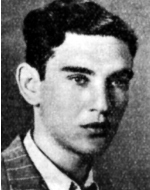Horowitz, Dov
Son of Bunia and Jacob, was born on 21.8.1926 in the city of Romanovka, in Serbia, which was then under Romanian rule. In September 1935 he immigrated to Israel with his parents and his father was appointed manager of a savings and savings fund in Ramat Gan. Dov studied at the elementary school in Ramat Gan, was educated in the parents’ home in the traditional spirit and learned Talmudic lessons. He had a sharp mind and worked hard on the problems that besieged our world. Dov continued to study and graduated from the “Ohel Shem” high school in Ramat Gan and excelled in mathematics. For a year and a half he served in Notarot in southern Israel. He sent his papers to the Faculty of Medicine of the Sorbonne in Paris and was accepted, but as a member of the Haganah he did not receive an exit permit and postponed his trip to quieter times. For a while he was active in the work of the Jewish National Fund in Ramat Gan. Once he was sent by the Haganah with six guards to bring drawings and topographical photographs from the Galilee. Because of the assaults of Arabs who needed the protection of the British police, and he, who carried drawings and photographs in Bilkuto, managed to convince the British that he and his friends had gone on a trip, and was saved from searching for their belongings. Dov served in the Alexandroni Brigade, participated in many battles in the Sharon and Samaria (the capture of Kola, Salameh, the police action in the Gaza Strip and the breakthrough on the main road to Haifa). When the driver refused to approach the car to the danger zone, he forced him with a gun to do his duty to the end, saved his people from thirst and helped the successful conclusion of the operation. – The day was offered for a medal of excellence. After completing a commanders’ course, he was offered the opportunity to remain as a guide, and his parents persuaded him to remain in the rear, but he rejected the offer by saying: “So who will go to the front to fight?” And went to combat service in front. When he came home for two days off, he was immediately called back to his unit. During Operation Horev, a “liquidation” operation was carried out against the “Faluja pocket,” in which an Egyptian brigade was besieged. The attack took place on the eastern flank of the “pocket” in the area of Iraq al-Manshiyya. The Alexandroni forces broke into the village from the south and took over part of it, but their assault on the hill north of the village was repulsed. Meanwhile, the Egyptians recovered, attacked and forced our forces to withdraw. Part of the force was trapped inside the village. In this battle he fell on the 28th of Kislev 5709 (December 28, 1948). He was buried in Faluja. After his fall, he was given the rank of sergeant. In memory of his activities for the redemption of the land, the National Committee of the Jewish National Fund, with the participation of his parents, planted a garden named after him in the forests of the Jewish National Fund. On the 17th of Kislev 5710 (8.12.1949) he was transferred to the eternal rest of the military cemetery at Nahalat Yitzhak.
